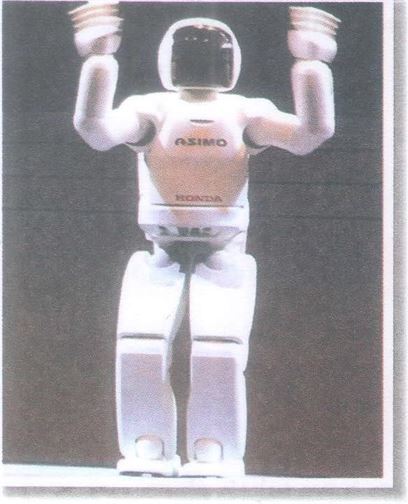FCE listening about robot speaking about changes in last century
فایل صوتی اف سی ای درباره ی ربات ها و تغییراتی که تکنولوژی در صد سال گذشته داشته است


robot /'raubot/ noun [c]: a a machine that can do work by itself, often work that humans do
b a machine that looks and talks like a human, and can do many of the things humans do

Company reveals robot with "sense of smell and taste'
2 You will hear an interview with a robot scientist. For questions 1-7, choose the best answer (A, B or C).
HOW TO GO ABOUT IT
Underlining key words in the questions or sentence beginnings will help you focus on the information you are required to listen for. The first one has been done as an example.
I can't really tell you that, I'm afraid. It's not that I don't want to, it's just that we've all been given our instructions and signed an agreement not to give anything away until it actually comes onto the market. I don't quite know when that will be, but probably some time early next year.
OK, well we'll look forward to that.In the meantime, perhaps you could tell us what you think are the most important applications of robots in our lives. Why are they useful?
Well, they help us to do what we call 'the three Ds', That's anything which is dull, dirty or dangerous. They can be used in the home or in the car manufacturing industry, to do dull or monotonous work; they're used for doing dirty jobs like mining or cleaning toxic waste; and then they have applications in the military or in the dangerous business of space travel. Of course, that's not an exhaustive list, but it gives you an idea of the range of different uses they have - and also of the variety involved in my line of work.
Yes, indeed. Let's talk if we may about one area in particular, though, the more humanoid robots, the ones with a recognizable human form. What are the latest developments there?
Hmm, yes, the ones being built now are able to see, hear, touch and even smell and taste. Others can show a range of emotional states, such as sadness, joy, anger and even comical surprise. They can even recognize emotions in humans, by interpreting people's body-language - the postures they adopt, the gestures they make. The hope is that people will be more willing to welcome robots like these into their homes, and they could act as companions and home helps for the sick or the elderly.
Amazing. But isn't all this a little bit worrying - robots with emotions? Isn't there a danger of science fiction becoming science fact, with robots taking over?
Yes, unfortunately, robots do get rather a bad press sometimes, don't they? Particularly in films and video games where they're either objects of humour and ridicule which we laugh at or else they're menacing characters which threaten to destroy the whole human race. But no, there is actuallv an ethical code which sets out what we can and can't do in robot design - and one thing we won't do is allow ourselves to lose control over our creations.
Don't you think, though, that robots will make us lazy, that we'll no longer want to do anything that requires any effort?
I think the car's already done that to us. It's made us physically very lazy. We don't walk so much as we used to and our bodies have suffered as a result. I think robots could well have the same effect on our brains. If we let intelligent robots do all of our thinking for us, there is a danger we won't be able to make any of our own decisions, that we'll become mentally lazy. And that, I think, is just as worrying.
Do you really think that the day will come when most homes have their own robot?
If you think back to just thirty years or so ago,few of us then would have predicted that we'd soon have a personal computer in our home, be logging onto the Internet and downloading hundreds of songs and videos onto a thing called an MP4 player. So why shouldn't we all have robots? We've been talking about them for nearly a century now and certainly, their initial development wasn't quite as fast as we thought it would be. But now, with advanced computer technology available, very rapid changes are taking place in robot design.
Yes, I remember those rather clumsy-looking machines at the end of the 1990s.
That's right. The.first humanoid robots could do very little, then later models learnt to sit.down and stand up, then talk, walk around, dance and so on. It's rather like watching a child grow. Through television and other media, the public is slowly growing accustomed to the idea of robots as a reality, and when they eventually become widely available, people will be ready for them.
Thank you, Keith. It's been fascinating having you on the programme.
1 What does Keith say about his company's latest project?
2 How does Keith describe his work?
3 What is the possible result of having robots that can display and detect emotions?
4 What does Keith say about robots in films?
5 Keith expresses concern that robots might cause us
6 Keith says that progress in the robotics industry
7 What does Keith say about humanoid robots?
Do you think that robots will one day be as common in homes as computers? Why/Why not? TALK ABOUT IT NOW
Speaking 1
Collaborative task
Read tasks 1 and 2 below. Then, before you do the tasks, read the information in the boxes.
1 Your class has decided to do a project on changes and developments over the last century. Talk with your partner about some of the changes that have taken place in the different areas below. TALK ABOUT THEM NOW
What changes have taken place in these different areas over the last century?
1 Education
2 Communication
3 Free time
4 Medicine
5 Travel and transport
2 Now decide in which two areas the most positive changes have taken place.DESCUSS ABOUT IT

HOW TO GO ABOUT IT
- Part 3 is an interactive task. As well as giving your own opinions, ask your partner what they think, and respond to their comments by agreeing, disagreeing, or adding a further comment.
- In task 1 you can talk about the areas in any order you choose. Say as much as you can about each one.
- The photographs on this page are there to give you at least one idea for each area. (There are no pictures for Part 3 in the Cambridge English: First exam.)
- Do not start to make your decisions for task 2 while you are doing task 1. They are two separate tasks.
- In task 2 you do not have to agree with your partner when making your final decision.
- In the exam you have two minutes for task 1 and then about a minute for task 2. However, allow yourself more time as you practise for Part 3 in the early units of Ready for First.
USEFUL LANGUAGE
Relevant grammar areas
Present perfect: e.g. Technology has changed the way we communicate.
Past habitual behaviour: e.g. We used to play outside more.
Present habitual behaviour: e.g. It's quite normal for schools to provide laptops now.
Comparisons: e.g. We're a lot healthier now thanks to medical advances.
Asking questions
Can you think of any more changes?
Do you have any other ideas?
Do you agree with me on that?
Agreeing and disagreeing
That's right/true.
I think so, too.
I agree (up to a point).
That's not right/true.
I really don't think so.
I completely disagree.


